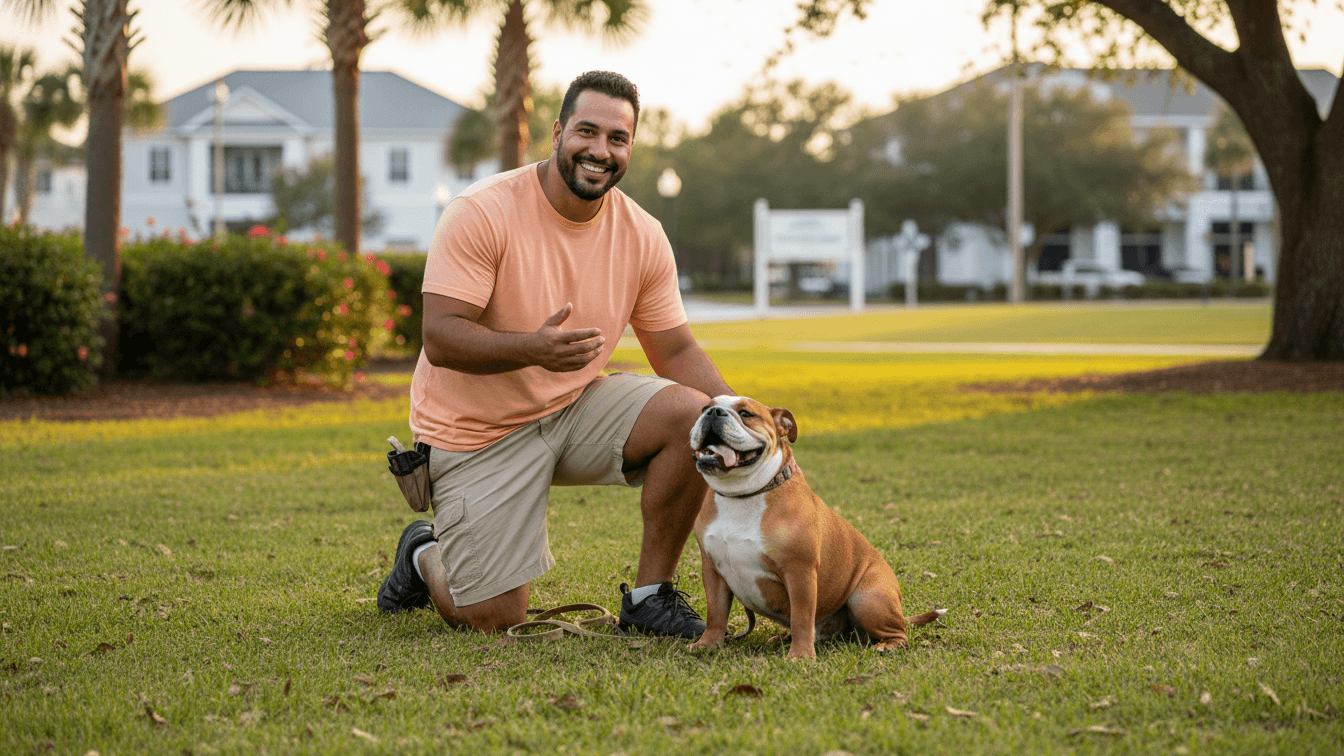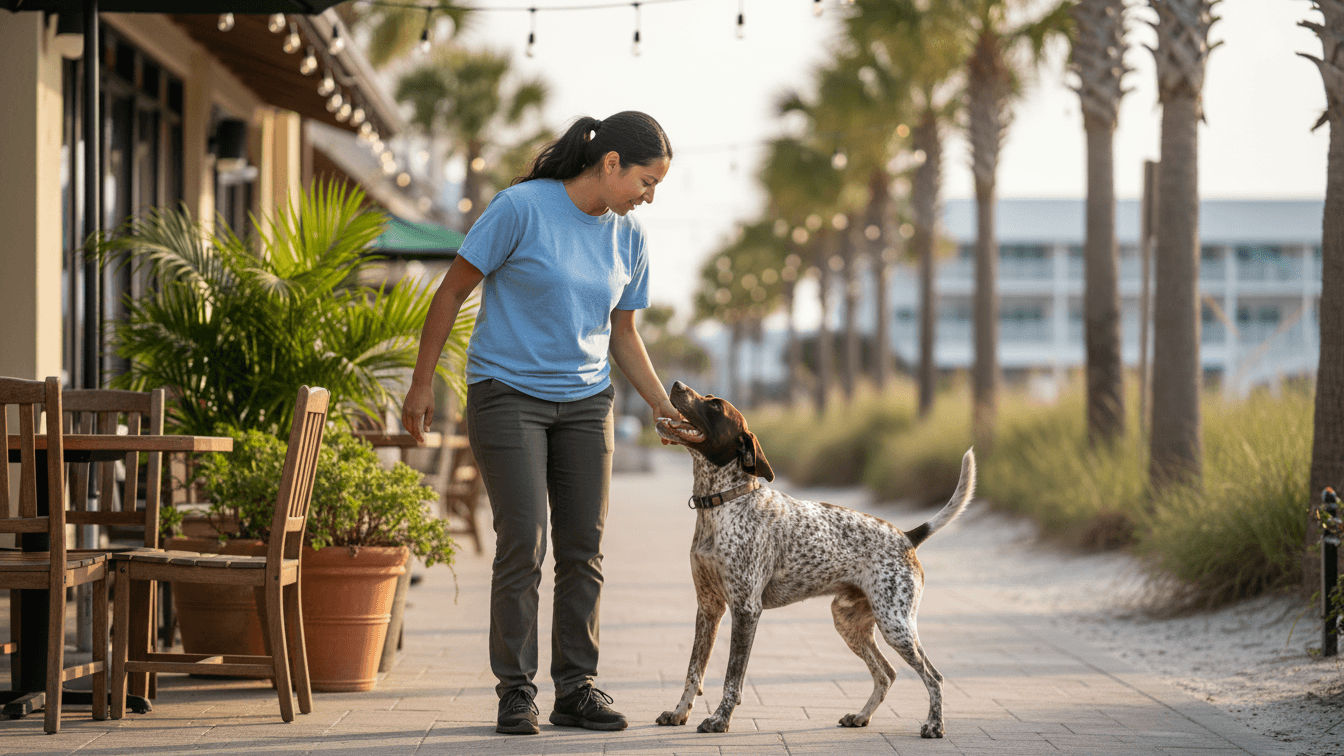Your Complete Guide to Choosing a Dog Trainer in North Myrtle Beach and Surrounding Areas
Living with a dog in North Myrtle Beach means year-round beach access, bustling tourist corridors, and family-friendly spaces like Barefoot Landing. Your dog needs to handle crowds during peak vacation season, stay calm near golf carts on Main Street, and walk politely past beachgoers and bicyclists without pulling or lunging.
Since North Myrtle Beach sits in Horry County, most local regulations follow city and county codes. When you find a professional dog trainer who understands these local details, you’ll get better results both at home and throughout your coastal community.
How to Choose the Right Trainer
Start by looking for someone who uses positive reinforcement training and can set realistic goals for your North Myrtle Beach lifestyle. This means your dog should learn to walk calmly through busy parking lots at Barefoot Landing, stay focused near outdoor dining areas, and handle golf cart traffic without barking or chasing.
Credentials give you a quick way to compare trainers’ experience levels. Common dog trainer certifications include KPA-CTP, CPDT-KA, or IAABC-CDBC for behavior problems. If your dog has serious aggression issues, look for someone with CBCC-KA or a science-based program.
In-home dog training works great for puppy manners, door greetings, and neighborhood leash skills. Group classes make sense once your dog can focus around other dogs, especially before you try busy spots like barefoot-friendly shopping areas or restaurant patios.
Common Dog Training Methods Explained

Reward-based methods build the trust you want while creating lasting behavior changes. They also help your dog follow Horry County’s rules about keeping pets under control in public.
Basic obedience covers sit, down, stay, place, recall, and leash training so your dog can handle walks, outdoor patios, and beach boardwalks without pulling or jumping on tourists and families.
Puppy training focuses on socialization, potty training, bite control, crate comfort, and early leash skills. Starting with short, positive training sessions prevents bad habits from forming in the first place.
Behavior modification addresses fear, reactivity, resource guarding, or separation anxiety through careful desensitization and counterconditioning. For serious cases, ask if your trainer works with local veterinarians.
Private lessons and in-home sessions let you customize everything around your daily routines, while day training can speed up results when you’re short on time.
Dog training classes help your dog practice good manners around other dogs and people. The best group classes give dogs plenty of space, screen participants carefully, and teach calm behavior rather than just excitement.
Specialized programs like therapy dog training or service dog training require extra structure, public-access skills, and a very clear step-by-step training program.
Stay away from trainers who use fear, intimidation, or pain to get results. Humane methods are safer for everyone, easier to maintain long-term, and much better for keeping peace in vacation rental communities and condo buildings.
Average Cost of Dog Training in North Myrtle Beach SC (Updated for 2025)
Prices around North Myrtle Beach and Horry County depend on the trainer’s experience, how long sessions last, and where the training happens. Here’s what most local pet owners are paying in 2025.
| Service Type | Average Cost (North Myrtle Beach/Horry County) |
|---|---|
| Puppy classes (4-6 weeks) | $140-$260 total |
| Group obedience classes (4-6 weeks) | $150-$285 total |
| Private lessons (60-90 min) | $100-$180 per session |
| In-home coaching packages (4-6 visits) | $400-$850 total |
| Day training (trainer works your dog + handoff) | $425-$900 per week |
| Behavior consult for reactivity/anxiety (initial) | $140-$240 |
| Board and train (2-4 weeks) | $1,900-$4,200 total |
You’ll probably pay extra travel fees for longer distances within Horry County, and expect higher rates for complex behavior work.
Make sure you understand what’s included, how the trainer tracks progress, and whether they offer a free consultation before you sign up.
Questions to Ask a Potential Dog Trainer
- What training methods do you use, and how do you keep training sessions positive and low-stress?
- What credentials do you have, like KPA-CTP or CPDT-KA? Do you keep up with continuing education such as CPDT-KSA?
- How will you customize the training program for my dog’s specific needs and our North Myrtle Beach lifestyle?
- Do you offer in-home visits, group classes, or day training, and which approach fits my goals best?
- How will we measure my dog’s progress and know when to add more distractions?
- What are the total costs, including any travel fees, and what’s your cancellation policy?
- Do you carry liability insurance, and can you show me proof?
- For behavior problems, will you work with my veterinarian if needed?
- What should I practice between our sessions to help my dog keep improving?
Local North Myrtle Beach Rules and Considerations
North Myrtle Beach enforces leash laws and pet ordinances to keep beaches, parks, and neighborhoods safe for everyone. Horry County follows South Carolina’s public health requirements too.
Leashes are required in all public spaces, including beach access points and city parks. Dogs are not allowed on the beach strand between 9:00 AM and 5:00 PM from May 15 through September 15 to accommodate peak tourist season. Outside those hours and dates, leashed dogs are welcome on the beach.
South Carolina law requires current rabies vaccination for all dogs. You can get these through county clinics or your regular vet, and find more details through the South Carolina Department of Health and Environmental Control.
Excessive barking can be considered a nuisance under city noise ordinances, so work with your trainer on alert barking and separation anxiety before neighbors or property managers start complaining. This is especially important in vacation rental communities and condo complexes.
South Carolina doesn’t require special licenses for dog trainers, but if a business boards dogs for payment, the state may oversee kennel licensing through the Department of Labor, Licensing and Regulation.
Horry County Animal Care Center provides resources regarding lost pets, microchips, and other county services.
Local North Myrtle Beach and Surrounding Areas Resources for Dog Owners
These spots give you great places to practice polite manners, work on recalls, and provide safe enrichment for your dog. Always follow the posted rules and etiquette guidelines.
- McLean Park offers open spaces and walking paths where you can practice leash skills and basic obedience away from heavy foot traffic
- Barefoot Landing provides a pet-friendly shopping and dining environment where your well-behaved dog can practice calm behavior around crowds and distractions
- North Myrtle Beach Park and Sports Complex features walking trails and open areas for training sessions during quieter times of day

FAQs
How much does in-home dog training cost?
Most North Myrtle Beach trainers charge $100-$180 per in-home visit, with discounts available when you buy packages. Behavior problems typically start at the higher end of that range.
Is in-home dog training worth it?
Absolutely, because you’re working on problems exactly where they happen. Your trainer can fix door manners, jumping on guests, counter-surfing, and yard reactivity right at home, then step outside to practice leash skills on your actual neighborhood sidewalks or near golf cart paths.
Can you pay someone to house train your dog?
Yes, many trainers offer puppy programs that include potty training, crate routines, and daily schedules. Day training can speed up the process while teaching you how to maintain the progress.
What is the 3-3-3 rule for dog training?
This is a helpful timeline for new or adopted dogs: expect about 3 days for your dog to decompress, 3 weeks to learn your routines, and 3 months to feel completely settled. Good training plans work with this natural adjustment period.
How long will it take to reach my training goals?
Most puppies and friendly adult dogs show solid progress within 4-8 weeks if you practice daily. Fear, reactivity, or aggression typically requires several months of careful behavior modification with gradual increases in difficulty.
What should I bring to group classes?
Pack a flat collar or harness, a 6-foot leash, high-value treats, water, and current vaccination records if your trainer requests them. Leave retractable leashes at home for safety reasons.
What’s the leash law in North Myrtle Beach?
Dogs must be leashed and under control in all public areas. On the beach strand, dogs are prohibited between 9:00 AM and 5:00 PM from May 15 through September 15. Outside those hours and dates, leashed dogs are welcome on the beach.
Do I need a dog license in North Myrtle Beach or Horry County?
Horry County doesn’t require general pet licenses, but keep your dog’s rabies vaccination current and the tag on their collar. For county services and microchip information, visit the Horry County Animal Care Center.
What shots does my dog need in Horry County or South Carolina?
Rabies vaccination is required throughout the state. Your veterinarian may also recommend distemper-parvo and bordetella based on your dog’s lifestyle and exposure to other pets.
Are dog trainers required to be licensed in North Myrtle Beach or Horry County or South Carolina?
No special trainer licenses exist in South Carolina. Trainers follow normal business regulations, but if they offer board and train services, their facility may need to be licensed as a boarding kennel under state regulations.
Where can I practice off-leash recall?
Unfortunately, North Myrtle Beach doesn’t have designated fenced dog parks within city limits. Consider using a long training lead in open park areas during quiet hours, or travel to nearby communities with enclosed dog parks for safe practice.
Which dog parks allow training around North Myrtle Beach?
North Myrtle Beach doesn’t currently have designated dog parks within city limits. The nearest fenced dog parks are in Myrtle Beach and Conway, which offer off-leash areas for socialization and recall practice.
What beaches or trails allow dogs for training?
Leashed dogs are welcome on North Myrtle Beach strand outside of peak hours (before 9:00 AM and after 5:00 PM from May 15 through September 15). These beach walks are perfect for teaching calm focus around joggers, surfers, and other beachgoers while providing excellent distraction training.
How do I help my dog adjust to seasonal crowds?
Start training for dogs during quieter months so your pup builds confidence before peak tourist season. Practice walking near busy areas like Ocean Boulevard during off-peak hours, gradually increasing exposure as your dog shows calm behavior. Expert dog trainers can help with desensitization plans specific to seasonal crowd challenges.
What if my dog has reactivity issues around golf carts?
Golf carts are everywhere in North Myrtle Beach, so addressing reactivity early prevents bigger problems. A certified dog trainer can create a behavior modification plan using distance and positive reinforcement to help your dog stay calm when carts pass by.
The right combination of thoughtful planning, humane methods, and consistent practice around North Myrtle Beach’s beaches and neighborhoods will help your dog become a confident, well-behaved companion. If credentials matter to you, don’t hesitate to ask about dog trainer certifications and how your trainer stays current with new techniques.
